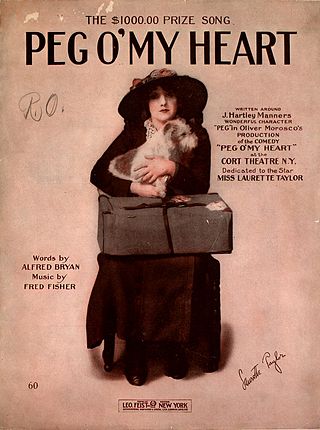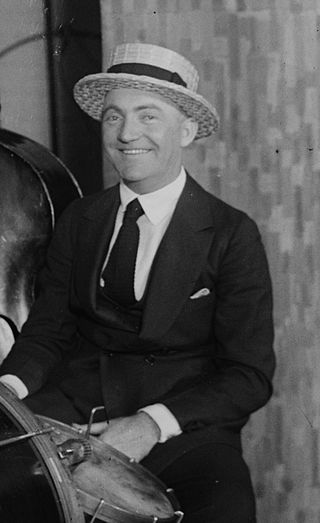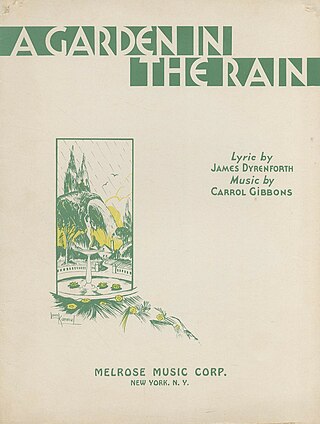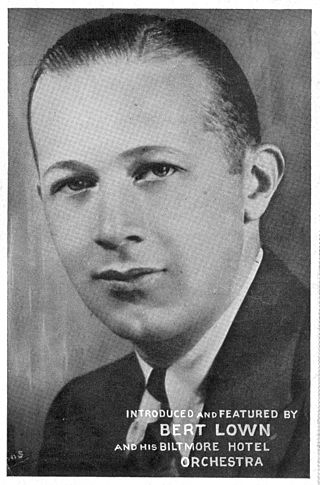This article needs additional citations for verification .(November 2022) |
Earl Burtnett (February 7, 1896 – January 2, 1936) [1] was an American bandleader, songwriter and pianist who was popular in the 1920s and 1930s.
This article needs additional citations for verification .(November 2022) |
Earl Burtnett (February 7, 1896 – January 2, 1936) [1] was an American bandleader, songwriter and pianist who was popular in the 1920s and 1930s.
Burtnett was born in Harrisburg, Pennsylvania. He attended Pennsylvania State College but left after two years. He began having songs published, including "Canadian Capers" (1915) and "Down Honolulu Way" (1916), and in 1918 joined Art Hickman's touring band. Shortly afterwards, promoter Florenz Ziegfeld heard the band in San Francisco, and featured them on Broadway in the Ziegfeld Follies of 1920 . [1] [2] [3]
After they moved back to California, Burtnett continued as lead arranger and writer for the Hickman orchestra, his successful songs including "Sleep", "Leave Me With A Smile" (1921), "Mandalay" (1924), and "If I Should Lose You" (1927). In 1929, he took over as band leader on Hickman's retirement. His band then had a residency at the Biltmore Hotel in Los Angeles, and recorded for Brunswick Records backing the Biltmore Trio. They also appeared in two films, The Flying Fool (1929) and The Party Girl (1930), billed as "Earl Burtnett and his Hotel Biltmore Orchestra and Trio". [3] They played across the country in the early and mid 1930s, with periods at both the Rice Hotel in Houston (from 1933), and later at the Drake Hotel and other venues in Chicago, where their concerts were often broadcast on WGN radio. [1] [2]
Burtnett recorded for Columbia from 1926 through 1928 when he signed with Brunswick and recorded prolifically through mid-1931. There was a further session in Chicago in May, 1934 for Columbia. During that break, his band was apparently making transcriptions, but none have ever turned up.[ citation needed ]
On Christmas Eve, 1935, Burtnett underwent an appendectomy at Illinois Central Hospital in Chicago. However, peritonitis set in after the operation, and he died on January 2, 1936, at the age of 39. [1] [2]

Brunswick Records is an American record label founded in 1916.

"Peg o' My Heart" is a popular song written by Alfred Bryan (words) and Fred Fisher (music). It was published on March 15, 1913 and it featured in the 1913 musical Ziegfeld Follies.

Ben Pollack was an American drummer and bandleader from the mid-1920s through the swing era. His eye for talent led him to employ musicians such as Benny Goodman, Jack Teagarden, Glenn Miller, Jimmy McPartland, and Harry James. This ability earned him the nickname the "Father of Swing".

Orie Frank Trumbauer was an American jazz saxophonist of the 1920s and 1930s. His main instrument was the C melody saxophone, a now-uncommon instrument between an alto and tenor saxophone in size and pitch. He also played alto saxophone, bassoon, clarinet and several other instruments.

Shep Fields was an American bandleader who led the Shep Fields and His Rippling Rhythm orchestra during the 1930s. His distinctive Rippling Rhythm sound was featured on big band remote broadcasts from historic hotels nationwide and remained popular with audiences from the 1930s into the early 1960s.

Theodore Salvatore Fiorito, known professionally as Ted Fio Rito, was an American composer, orchestra leader, and keyboardist, on both the piano and the Hammond organ, who was popular on national radio broadcasts in the 1920s and 1930s. His name is sometimes given as Ted Fiorito or Ted FioRito.

Russell Morgan was an American big band leader and arranger during the 1930s and 1940s. He was best known for being one of the composers of the song "You're Nobody till Somebody Loves You", with Larry Stock and James Cavanaugh, and was the first to record it in 1944. Russ Morgan died from a hemorrhagic stroke in 1969 at the age of 65. Today he is known for three songs. The three songs are famous because of another artist, The Caretaker, covered them for his album, Everywhere at the End of Time. The first song is “Goodnight my Beautiful” and it was covered and renamed “Libets Delay.” The second one is “Moonlight and Shadows” which was covered and renamed “Childishly Fresh Eyes.” And the third one is “Room with a View” covered and renamed to “My Heart will Stop in Joy.”

Arthur George Hickman was a drummer, pianist, and bandleader of one of the first big bands.

Abe Lyman was a bandleader from the 1920s to the 1940s. He made recordings, appeared in films and provided the music for numerous radio shows, including Your Hit Parade.

The Three X Sisters were an American all-girl harmony singing trio initially known as The Hamilton Sisters and Fordyce. They were on stage singing together in New York City, on Broadway, as early as 1922 and formed their trio in 1924, which was composed of Pearl Santos and Violet Hamilton from Cumberland, Maryland, and Jessie Fordyce from Brooklyn, New York. They were known on NBC radio as "radio's foremost harmony trio".

"A Garden in the Rain" is a popular song. The music was composed by Carroll Gibbons, the lyrics by James Dyrenforth. The song was published in 1928. The song was first recorded by Gibbons with the Savoy Hotel Orpheans and vocals by George Metaxa, in July 1928. Gibbons took over as bandleader of the Savoy Hotel Orpheans in 1931, and the tune became his Savoy signature.

Bert Lown was an American violinist, orchestra leader, and songwriter.

A big band remote was a remote broadcast, common on radio during the 1930s and 1940s, involving a coast-to-coast live transmission of a big band.
Federico "Fred" Díaz Elizalde was a Spanish Filipino classical and jazz pianist, composer, conductor, and bandleader, influential in the British dance band era.

"Chlo-e " (1927) is a show tune with music by Charles N. Daniels, writing under the pseudonym of "Neil Morét," and lyrics by Gus Kahn. It is now regarded as a jazz standard.
Bernard Joseph Cummins was an American jazz drummer and bandleader.

Ray Miller (1896–1974) was an American bandleader who was popular during the 1920s. In 1924 his orchestra performed at the White House with Al Jolson, the first jazz band to do so.

"Sweet Sue, Just You" is an American popular song of 1928, composed by Victor Young with lyrics by Will J. Harris. Popular versions in 1928 were by Earl Burtnett and by Ben Pollack.

Herbie Kay, born John Herbert Powers Kaumeyer was an American guitarist, trumpeter and big band leader. During the 1930s, his band gained a following in the Midwestern United States. Kay was also the first husband of actress Dorothy Lamour. His 1935 recording of the song "Rhythm Steps" gained mainstream attention starting in 2022 thanks to Internet exposure.

June Pursell was an American singer, songwriter, and actress, who also played the ukulele. Born as Mary Pursell on December 16, 1902, in Indianapolis, Indiana, she made notable contributions to the world of music and film during her career.